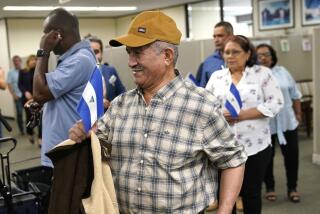Fast Against Contras Marks Its 39th Day
WASHINGTON — “We can’t wait around for another year while a thousand more Nicaraguans are killed,” said Charles Liteky, sitting in a wheelchair by the steps of the U.S. Capitol on Thursday. “At least we can put our bodies where our mouths are.”
Liteky’s political sentiments echo those of many other activists opposed to U.S. support for the rebels called contra s fighting the Sandinista government in Nicaragua. But his method of expressing his opposition is drawing grim attention to the cause in the nation’s capital.
The 55-year-old Vietnam veteran, a former Roman Catholic priest from San Francisco, on Thursday marked his 39th day of a fast outside the Capitol. He has vowed to continue it until there is a “significant signal of protest from U.S. citizens condemning U.S. government policies in Central America.”
Visitors Increasing
Liteky’s vigil, and that of three other veterans who have joined him in fasting, is drawing increasing numbers of visitors to their perch on the Capitol steps to see the physical effects of their protest and to hear their explanation for it.
Though physically weak and with ankles so swollen that walking is painful, Liteky assures all visitors that the spirits of the fasters are buoyant.
“There is a certain joy,” he told a small crowd of bystanders Thursday. “Since I began this fast I’ve never been happier in my life.”
Liteky, the chief spokesman for the protest, and George Miso, 40, a U.S. Army combat veteran from Trenton, N.J., began the “Veterans Fast for Life” on Sept. 1. They were joined on Sept. 15 by Duncan Murphy, 66, a World War II Army veteran from Sulphur Springs, Ark., and by S. Brian Willson , 45, a former Air Force security officer from Chelsea, Vt., who also served in Vietnam.
Medals Returned
Earlier Thursday, in further gesture against U.S. foreign policy, Miso joined a group of American war veterans who returned dozens of combat medals at a ceremony at the Vietnam Veterans memorial. Miso said he felt “no remorse” about returning his six medals.
“I feel very liberated, very free,” he said later.
Liteky, who served in Vietnam as a priest, had left his Medal of Honor at the memorial earlier. He won the medal, the nation’s highest military honor, for pulling several soldiers to safety in a jungle fire fight.
Take Sunday Off
Except for Sunday, the four men spend four hours every afternoon on the steps under a large blue and white banner and a makeshift sign that lists the day of their fast.
“We’ve given up all of our possessions and our jobs,” Liteky told one passer-by. “The last thing we have to give up is our lives.”
Since they began fasting, all have lost considerable weight. At first, they said, they suffered pangs of hunger, but now they are numb.
Each protester drinks a gallon of water daily and takes vitamins. But medical experts say the effects of the fast on their health will soon become severe. Death is likely after 60 to 70 days without food.
Often Think of Food
Though the men say they often think of food, Willson said they will not yield to temptation.
“I know why I am fasting and I am committed to do it,” he said. “I’m here because I’m responding to what my country is doing in Nicaragua.
“People come and expect to see us depressed,” he says, “but we feel very peaceful, very free.”
The four say they are optimistic that their gesture will draw a response from the American public to their cause.
More to Read
Sign up for Essential California
The most important California stories and recommendations in your inbox every morning.
You may occasionally receive promotional content from the Los Angeles Times.










